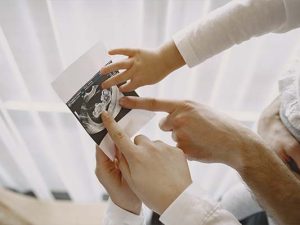How To Recognize Implantation Bleeding and Early Signs of Pregnancy
Transcription;
Dr Marc Sklar:
So I often get questions from patients, or all of you, watching here on YouTube and my fertility TV channel, about confusion, if you’re getting your period, or if this is just what we call implantation bleeding, that mysterious magical implantation bleeding. And actually I got that exact email, with tons of basal body temperature charts this week, which is why I’m coming to you to answer this exact question.
Dr Marc Sklar:
So in this video, I’m going to be talking about common pregnancy symptoms, and how to differentiate those from those that come with your period. Stay tuned.
Dr Marc Sklar:
Before we begin this video, I want to quickly announce that to celebrate a hundred thousand subscribers, I’m doing a live where I’m talking about my five favorite fertility supplements for 2020. Click the link below to register for this live masterclass, where I’m going to share my fertility supplement protocol with you.
Dr Marc Sklar:
So, hi, I’m Dr Marc Sklar, The Fertility Expert. I work with couples from all over the world, helping them get pregnant naturally. If you’re trying to get pregnant, then subscribe and hit the bell, so that I can help you too.
Dr Marc Sklar:
So this is a very common question that I get asked. Implantation bleeding or spotting, what does it look like, and am I having it? And actually this exact week, I’ve been going back and forth with one of my awesome followers and community members and tribe members, because she’s had all of these symptoms and signs, including all the shifts that we’d like to see in her BBT. And she was wondering if she was actually pregnant or not. And so that is the spark, if you will, for the details of this video.
Dr Marc Sklar:
So the important thing, or one of the important things, I should say, there’s many when it comes to this, that we should recognize is that implantation spotting or bleeding does not happen for all women. It does happen for some, but it’s not a must. You could still be pregnant without it, and you still might have spotting or bleeding around that same time, and actually might not be pregnant. So I know that sounds confusing, but hopefully by the end of this video when I give you all the more details that are involved with it, it will all make a little bit more sense for you.
Dr Marc Sklar:
So what are the signs, if you will, of implantation? One of the first ones, and a great one, especially if you are already tracking your basal temperature, as I alluded to earlier, is your BBT, or your basal body temperature charting. You might actually see a dip in your temperatures in the luteal phase, somewhere between six days to 10 days post. I do have some women who might see that dip a little bit later, but I don’t find that to be as common. I do mostly find that it happens somewhere between day six and 10.
Dr Marc Sklar:
Implantation usually does start to happen around six to seven days, maybe eight days, post-ovulation. And so that would be when we’d expect to see this dip in the basal temperature chart, like I’m describing. So your chart would go up, and then as you’re going across, in the luteal phase, six to 10 days into it, you’ll see a drop before you go back up.
Dr Marc Sklar:
So the other symptom of implantation is implantation spotting, or bleeding, which I mentioned earlier. Now, not every woman will get this around implantation, and quite frankly, I don’t see this that often, but if it does happen it will be typically more spotting than bleeding. You’re not really going to have a full bleed. You’re going to have more of just like a little spot, where you might just need a liner, or nothing at all, to manage it.
Dr Marc Sklar:
Timing of the implantation spotting, typically will happen post-ovulation, obviously, but more so seven, six to 10 days, beyond. So implantation starts to happen somewhere between day five and seven, and so implantation spotting, I tend to see, if I’m going to see it, somewhere around day six, seven, eight, nine, 10. It can go as long as day 12, I don’t see that that often. And the woman who reached out to me this week, when I saw the signs for her, that happened, it was eight days post-ovulation, so there is a window of time that that can happen. Obviously, with any bleeding, color’s always a factor, and this is no different. Considering that it’s spotting, we will tend to see it be lighter or brown. I have had patients remark that it has been almost every shade of red, but typically we will see it be more on the lighter red, or brown spotting as well.
Dr Marc Sklar:
So anytime we talk about any type of bleed, we do talk about quantity of the bleed, and because this is spotting, it really shouldn’t be a lot. It shouldn’t be a big bleed, a more heavy bleed. On rare occasions, I have seen patients who have had a heavier implantation bleed, but it will only happen for a short period of time. That will only happen for about a day or less, and that really brings us to the timing factor of this. How long will it last, the duration of it. And implantation spotting really should not last for a long time, typically it will just last for a couple of hours, or it might just be a moment in time, but really not more than a day. Again, on rare occasions, I have seen it go beyond a day, but typically it would just be for that day, or part of it.
Dr Marc Sklar:
So another symptom of implantation is cramping. Now cramping could be a sign of all sorts of things. We could see cramping at ovulation, we could see cramping at implantation, we could see cramping at menstruation. You can also get cramping if you’re pregnant, so it’s not the best symptom in and of itself, but it can be a sign of implantation, if all of those things line up and you also have cramping in conjunction with that.
Dr Marc Sklar:
When we start talking about pregnancy symptoms, and can the symptoms you’re experiencing post implantation, and towards the end of the luteal phase be signs of pregnancy? I really don’t like to rely on the pregnancy symptoms that you’ll read about on Dr. Google. Yes. Do they happen? Absolutely. But can you be pregnant without any of those symptoms? 100%. I do find that the symptoms are more intense, and happen more frequently. The pregnancy symptoms, mind you, is what we’re talking about at this point, when patients are on progesterone, and if that is the case, that’s also another reason not to trust it. It will make, progesterone will mimic, or replicate, and produce those signs and symptoms that you might have when you were, when you are pregnant, but because you’re taking progesterone, they’re not the most trustworthy of symptoms. So we take it with a grain of salt. Would I rather have some symptomatology than none? Absolutely, but does that mean that you’re pregnant? That may or may not be the case.
Dr Marc Sklar:
One of the other things for us to take into account, when we’re talking about progesterone, is this association with spotting or bleeding, so we were just talking about implantation spotting or bleeding. I do find that with patients who are taking progesterone, and specifically the vaginal suppositories, or the vaginal medication, the cream essentially, that we’re talking about with progesterone, that can and often does irritate the vaginal lining and the cervix itself. And I do find that irritation actually causes spotting or bleeding for many women. So if you are one of those women who are spotting and bleeding, and you’re taking progesterone, just be mindful that that’s probably coming from the progesterone, and not from implantation.
Dr Marc Sklar:
I’m not saying it’s a bad thing, but progesterone usually stops the bleeding, doesn’t usually cause implantations spotting or bleeding. So just take that into account, and just know that where that’s coming from. Because that’s very common as well.
Dr Marc Sklar:
So what are signs of having a period, and not implantation or not pregnancy? Unfortunately some of these things do look the same, and can mimic one another. But a period, you could have, your spotting or bleeding will be closer to your time of menstruation, right. So it’s not going to happen a week before, you’re more likely to have that bleeding days leading up to menstruation, and hopefully that spotting, and it’s not just bleeding, and that it should typically be darker, be more clotty, if you will, and you’ll start to see that association more so with menstruation.
Dr Marc Sklar:
You can have more cramping, and that cramping is different than the cramping associated with implantation, because the one with implantation is more mild, and this one can be more intense and more severe. And this can also, meaning the signs of symptoms leading to menstruation, can cause more mood symptoms associated with it as well.
Dr Marc Sklar:
Coming back to my first point, where we were talking about basal body temperature charting, if you are charting, what you will typically see in your temperatures, in association with menstruation, is that your BBT will drop, and drop somewhat significantly, as you’re getting ready to, or just starting your period. So that’s definitely a sign. And then, obviously, your bleed will be much longer and heavier, in association with your menstruation.
Dr Marc Sklar:
What is the number one way to know if you are pregnant and if that implantation spotting or bleeding was actually, in fact, implantation? Well, in the end we do want to see that with a pregnancy test. So you can do a home pregnancy test. I don’t recommend doing these personally until you are a day or two past your expected menstrual date. I do know that many women like to do these early, I’m just not the biggest fan of it and I prefer to wait till afterwards, until a missed period, so that you know for sure that all of those things line up. But the best way is to take a home pregnancy test.
Dr Marc Sklar:
Once you do get a positive home pregnancy test, then my recommendation and something I always do with all my patients, is we do blood work. I want to know what the actual number of your HCG is. It’s not enough for me to know that it’s positive or negative. I want to know what that number is.
Dr Marc Sklar:
I also want to know what your progesterone number is, because that’s also important for me, and I will typically test those, again, two days later, because we want to see that the progesterone is maintaining at a good level, or increasing, and we’ve certainly want to see that HCG roughly double in that same timeframe. So that is, by far, the gold standard and that’s what I always recommend if you for sure want to know if you are pregnant.
Dr Marc Sklar:
Since we are talking about bleeding and pregnancy, I do want to just make a side note here for all of you, it is fairly common to bleed or spot during your pregnancy. I see this in many, many of my patients. The spotting or bleeding associated with your pregnancy does not have to be a bad thing, and because we do see it so frequently, what I can tell you is that 90% of my patients who do have spotting or bleeding with their pregnancy, everything turns out just fine. There’s many causes for it. Like I mentioned before, progesterone alone can cause some spotting or bleeding. There is something called a sub chorionic hematoma, or hemorrhage. Sounds scary, but usually those turn out just fine. And I’m not going to go into all of those details right now, I just want you to know that spotting or bleeding in your pregnancy is fairly common, so don’t get overly concerned about it, but definitely reach out to either your fertility specialist, or your OBGYN, so that they can just make sure that everything is going well, as I hope it would be.
Dr Marc Sklar:
Okay, so now that all of you understand a little bit more about implantation, spotting, the signs and symptoms around implantation, and menstruation, that was a lot of information, right? But now that we got that out of the way, let’s figure out why you’re not getting pregnant. I want you to know why.
Dr Marc Sklar:
So, let’s find out why, shall we? The most common diagnosis that people reach out to me for is the dreaded unexplained infertility. No one likes to hear, “We don’t know why you’re not getting pregnant,” especially me, because I don’t believe in that diagnosis. I don’t like it, and I don’t want to hear it. And you shouldn’t either, you should want to find out why, and get answers for why things have been difficult for you on this journey, right? So, for all of you who do want to know why you’re having troubles with getting pregnant, and you’re not satisfied with an unexplained infertility diagnosis, I’ve got the training for you.
Dr Marc Sklar:
It’s my Unexplained Infertility Explained Fertility seminar for all of you. So it’s about time that we get answers to those questions and we start to understand why you’re having these problems. And for me, the only reason that anybody ever gets diagnosed with unexplained infertility, and gets put into that category is because somebody hasn’t cared enough, or wanted to look deep enough, to figure out why you’re not getting pregnant.
Dr Marc Sklar:
Well, the somebody who does want to figure it out is me, and I want to help you to figure that out as well, which is why I created this seminar for you. This is my free training, to help you figure out why you’re not getting pregnant and start to get answers. If you want answers, then sign up and register for my free training. All you have to do is go to this link right here. You can also get the link down below into the description, or you can just go to marcsklar.com/unexplainedinfertility. That’s right. If you’re listening, and you can’t click on anything, just remember this, Marcsklar.com/unexplainedinfertility, or just click right there.
Dr Marc Sklar:
Remember to click the link below to register for the live training coming up, where I’ll be sharing with you my five favorite fertility supplements to get pregnant in 2020.
Dr Marc Sklar:
Did you like this video? If so, give me a thumbs up. Also, comment below. Let me know if you have any signs and symptoms of implantation, or if you’ve been diagnosed with unexplained infertility, because I want to know. And if you have not subscribed to my YouTube channel, you have to do that, so I can help you get pregnant. So click on the bell, so that you can subscribe. And once again, if you want that training to help you figure out why you’ve been diagnosed with unexplained infertility, then just click right here. Okay? Until next time, stay fertile.
H.O.P.E Coaching – Heal naturally to Overcome infertility & get Pregnant by Empowering your body
Who is this for: Any women trying to get pregnant for +6 months
It includes: 60 minutes coaching call with Dr Sklar, The Fertility Expert
During this 1 hour online fertility consultation with Dr Sklar, or his team of natural fertility experts, you will get all the fertility support you need, we will review your case, give you recommendations and create a next steps for a personalized plan to help you get pregnant
The H.O.P.E Coachingis a 60 minutes call where we will go over your fertility case and give you customized recommendations, that work for YOU. Me and my team of fertility doctors are here to help you improve your fertility to get pregnant.

Keep learning about How to EMPOWER your fertility naturally with weekly Fertility TV Episodes!
Almost 50,000 subscribers can’t be wrong! A fresh approach to natural fertility and women’s health, with tons of easy health tips on how to get pregnant and fertility science with a dash of humor! Get the weekly Fertility TV episodes with all you need to know when trying to get pregnant





